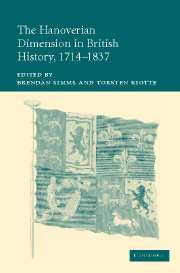Book contents
- Frontmatter
- Contents
- List of genealogical tables
- List of tables
- Notes on contributors
- Acknowledgements
- 1 Introduction. Hanover: the missing dimension
- 2 Hanoverian nexus: Walpole and the Electorate
- 3 Pitt and Hanover
- 4 George III and Hanover
- 5 The Hanoverian dimension in early nineteenth-century British politics
- 6 The end of the dynastic union, 1815–1837
- 7 The university of Göttingen and the Personal Union, 1737–1837
- 8 The confessional dimension
- 9 Hanover and the public sphere
- 10 Dynastic perspectives
- 11 British maritime strategy and Hanover 1714–1763
- 12 Hanover in mid-eighteenth-century Franco-British geopolitics
- 13 Hanover and British republicanism
- Index
7 - The university of Göttingen and the Personal Union, 1737–1837
Published online by Cambridge University Press: 13 July 2009
- Frontmatter
- Contents
- List of genealogical tables
- List of tables
- Notes on contributors
- Acknowledgements
- 1 Introduction. Hanover: the missing dimension
- 2 Hanoverian nexus: Walpole and the Electorate
- 3 Pitt and Hanover
- 4 George III and Hanover
- 5 The Hanoverian dimension in early nineteenth-century British politics
- 6 The end of the dynastic union, 1815–1837
- 7 The university of Göttingen and the Personal Union, 1737–1837
- 8 The confessional dimension
- 9 Hanover and the public sphere
- 10 Dynastic perspectives
- 11 British maritime strategy and Hanover 1714–1763
- 12 Hanover in mid-eighteenth-century Franco-British geopolitics
- 13 Hanover and British republicanism
- Index
Summary
The British literary critic and historian of the Enlightenment, Robert Shackleton, once called Hanover ‘an outpost of English civilization’, and the university town of Göttingen in particular, in the south of the Electorate, did indeed like to bask in the reflected glory of British power and English fashion like other outposts of the empire. At the nearby spa of Pyrmont, in the Waldeck principality, the Göttingen merchant Knierim established a stall where only English products were offered, and the university town itself celebrated English victories in the colonies with illuminations: ‘Göttingen is Londres en miniature’, wrote Caroline Michaelis – daughter of the eminent theologian Johann David Michaelis – following Rodney's naval victory over the French in 1782; indicating, incidentally, with her use of French that other points of reference remained important for the cosmopolitan university town. According to the Göttingen theologian and historian Ludwig Timotheus Spittler, English influence went beyond fashion, and affected what today would be called norms and values: ‘We like to consider ourselves half-English here, and certainly not just in fashion, dress, and manners, but in character.’ Historians of the German Enlightenment and of the history of science have confirmed this view. In particular, it has been emphasised how Göttingen functioned as a gateway for the influx of British political and social thought, and as a place where Anglophilie, the German image of Britain as a model of political ‘freedom’, economic prosperity, and sociable culture, was shaped.
- Type
- Chapter
- Information
- The Hanoverian Dimension in British History, 1714–1837 , pp. 128 - 160Publisher: Cambridge University PressPrint publication year: 2007
- 6
- Cited by



